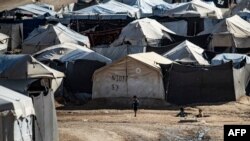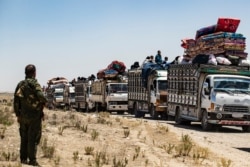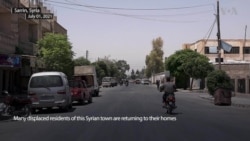Many displaced residents of the Syrian town of Sarrin are returning to their homes after spending years in al-Hol camp, which hosts thousands of people who lived under Islamic State (IS) rule.
More than two years after the military defeat of the terror group, many face major economic and social hardships.
Um Fatima is one of those who have recently returned to Sarrin after the U.S.-backed Syrian Democratic Forces (SDF) agreed to release her from al-Hol. She says life after displacement has been similarly difficult.
“If my situation continues like this, I will have no choice but to leave the entire country,” said Um Fatima, who lost three of her children during the war on IS.
While locals have welcomed her return to the town, she says her only source of financial support has been a male relative.
“His support won’t last forever, so if nobody takes care of my daughters and myself, we will have to leave. But if there is assistance, of course I would rather stay at my hometown,” she told VOA.
According to local officials, at least 40 families from Sarrin have returned to their homes in the last few months.
“We constantly receive people from al-Hol camp,” said Walid Kossa, a member of the Sarrin Civil Council, which is affiliated with an SDF-run local administration.
“We try to give them basic assistance, but our resources are limited,” he told VOA. “People here, especially this year, are doing really bad economically.”
Ahmed Shawakh is an activist who has sponsored the release of many families, including Um Fatima’s, from al-Hol. He hopes his humanitarian work will contribute to bringing stability to families who suffered under IS rule and in displacement camps as well.
“If these people stay longer at such camps, their ideology will remain the same,” Shawakh said. “Bringing them to their homes and families will help their reintegration into society.”
International aid organizations should step in to encourage returnees to stay, local officials said.
“There aren’t any active organizations that support those who choose to return, and those that work here have little support to offer,” Kossa said.










